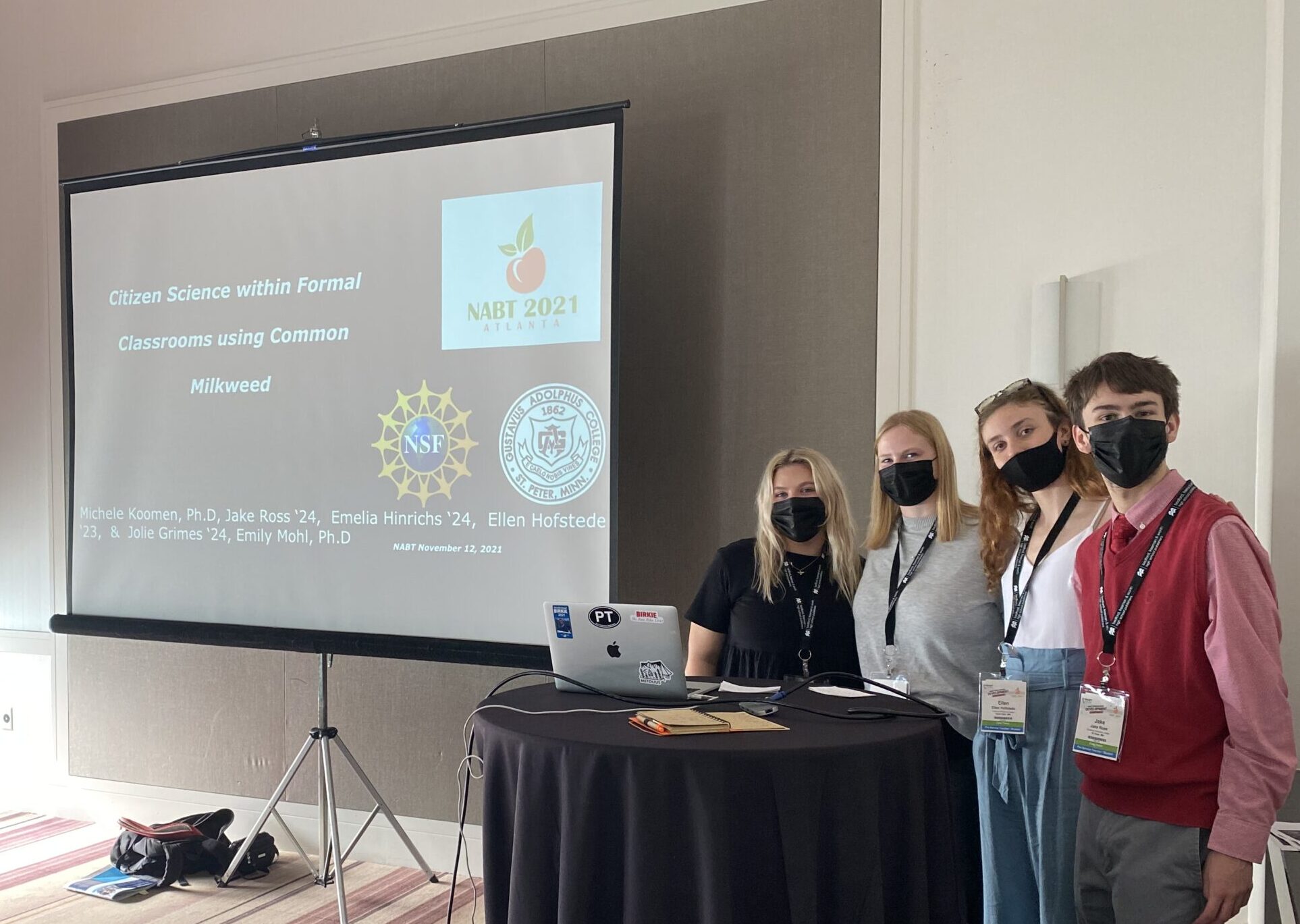Students Jolie Grimes 24’, Emelia Hinrichs 24’, Ellen Hofstede 23’, and Jake Ross 24’ have been conducting research supervised by Dr. Michele Kooman. Their research participants received seeds harvested from their local area and then seeds from another part of the country to plant and observe for themselves. The research group then used participant interviews to analyze outcomes for students in higher education who conducted these milkweed experiments. The students in this research group come from a variety of academic disciplines including Biology, Economics, Environmental Studies, and Kinesiology at the University of Minnesota.
Each student had their own unique role in the project and was able to gear tasks towards personal interests and their area of study. Hinrichs stated, “We all had different tasks at parts that contributed to our project and even our tasks now are kind of changing, but we all are kind of doing separate things that are working towards the project as a whole.” Hofstede and Grimes worked on transcribing interviews with research participants, Ross surveyed participants and collected data, and Hinrichs worked on the annotated bibliography. 
These students found the opportunity to conduct research with Dr. Kooman through campus posters. Job offerings around campus for a scientific research assistant job enticed them to apply and each student found their specialty within the project. “When I applied, I was majoring in biochemistry… and I’ve done research with monarchs before, so this is right up my alley,” said Hinrichs.
In November of 2021, the group presented their research at the National Association of Biology Teachers conference in Atlanta, Georgia which was the first time the group had ever met in person. “When we went to the conference was mainly when we had to merge all of our different parts together,” stated Grimes.
The students had a designated time slot where attendees could view their poster and learn about the highlights of their research. They have also presented at the Gustavus Summer Research presentations and Celebration of Creative Inquiry which were both virtual presentations. In these virtual sessions, the group found difficulty displaying their extensive research in short summaries for attendees to pop in and out of zoom calls. Regarding this online format, Hinrich stated, “it was hard to time it perfectly so that we weren’t leaving people with misinformation or not enough information of our project.”

This project is a multi-year endeavor which has included different groups of students throughout the years. January of 2021 marked the beginning of this group’s research with Dr. Kooman. The original focus was on citizen science with the local adaptation in common milkweed in grades 6-16. Common milkweed was chosen due to the lasting effects of its adaptation on a declining monarch butterfly population.
In the process of narrowing their project for publication, this group in particular favored the coordinated distributed experiments of the project and how their research impacts undergraduate students. “The research for graduates and undergraduates has given them opportunities to thrive after college,” said Hofstede.
In the coming months, this group aims to publish their research paper titled, Coordinated distributed experiments in higher education: There is a low barrier to entry and there’s potential for student projects. However, this publication is far from the end of their research. The group plans to continue working with Dr. Kooman and potentially create another paper with a focus on teacher workshops. According to Grimes, the workshops will be on, “how to integrate traditional indigenous knowledge into formal scientific classroom settings.”
After over a year of research, presentations, and paper writing, this group offers some advice for other students interested in research.
“Work on learning the process of papers, because it’s something that a lot of people do in their future schooling and education and jobs,” said Hinrichs
“Make sure you’re asking questions… Enjoy what you’re doing and really take a moment to think about… how it’s going to benefit you,” said Hofstede
“Read research that is adjacent to what you’re doing, especially if you’re not super familiar with the area. Figure out how things are done in the domain you’re working in,” said Ross.
